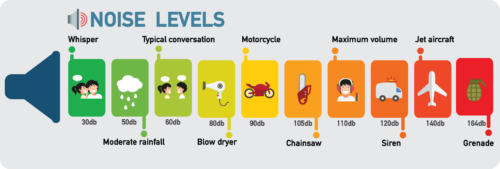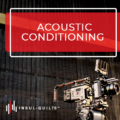Every day, we are experiencing an excessive amount of noise around us. From little indoor noises like tv, home appliances, loud music, ringtones, people to outdoor noises like HVAC, traffic noise, metro, machinery, electrical generators, lawnmowers, leaf blowers, and construction sites. Can all this noise pollution affect our health?
But What is noise pollution? Britannica’s* definition is unwanted or excessive sound that can have deleterious effects on human health, wildlife, and environmental quality.
Some noises are irritating, even if it’s as little as typing on your keyboard, which is not that loud but still can affect your coworker’s concentration. All noises affect everyday life at different levels, and they are measured by decibels (dB). A louder sound is equal to higher decibels.
The table below shows everyday common sounds and noises:
Noise pollution depending on the dB and the time exposed to the noise it could affect your health. Some of the health effects of the constant exposure to loud noises are loss of hearing, stress, insomnia, among others. Some people are more sensitive to others to noise.
Below are some of the ways you can try to minimize the noise pollution you can control at your home or workspace:
- When you are at home, you can reduce the TV volume, headphones, game systems, computers and keep your distance from certain noises like the laundry machine. If your surroundings are too noisy, take breaks away from the noise source.
- Improve your insulation is the most practical way to reduce noise pollution at home. If you soundproof your home or room with our Quilted Studio Blanket, it may help reduce the sound vibrations and noise. You can install it on the ceiling and walls.
- Another way to reduce the noise at home is to use rugs, carpets, cloth drapes, and fabric-based furniture. They can absorb the sound reflecting off of hard smooth floors.
- You can reduce the outdoor noise coming to your house by installing a fence combine with our Quilted Sound Blocker Blanket. This will help you to create a barrier that absorbs and stops the strong sound waves or vibrations.
- You can wear headphones at a construction site or factory to reduce the machinery noise and hang sound-absorbing industrial blankets around the machinery to localize the sound.
Maybe soundproofing is the best choice to reduce noises moving through your home You will need to use materials that have mass (weight) to block sound from entering or leaving a space as well as sound absorbing features. Your sleep too will improve by keeping sounds isolated in your home.
The Quilted Studio Blanket is an excellent solution for absorbing sound reflection and reverberant noise in a Studio, building, or open room. Our blanket features 90% sound absorption, an R-Value = 9, a 50% recyclable content, is certified VOC compliant, and reflects 97% of radiant heat.
Sources:
- Weiss, Cynthia. “Your Hearing At Risk? Protect Your Ears?” Mayo Clinic. Newsnetwork.mayoclinic.org.
- CDC · What Noises Cause Hearing Loss? https://www.cdc.gov/nceh/hearing_loss/what_noises_cause_hearing_loss.html



